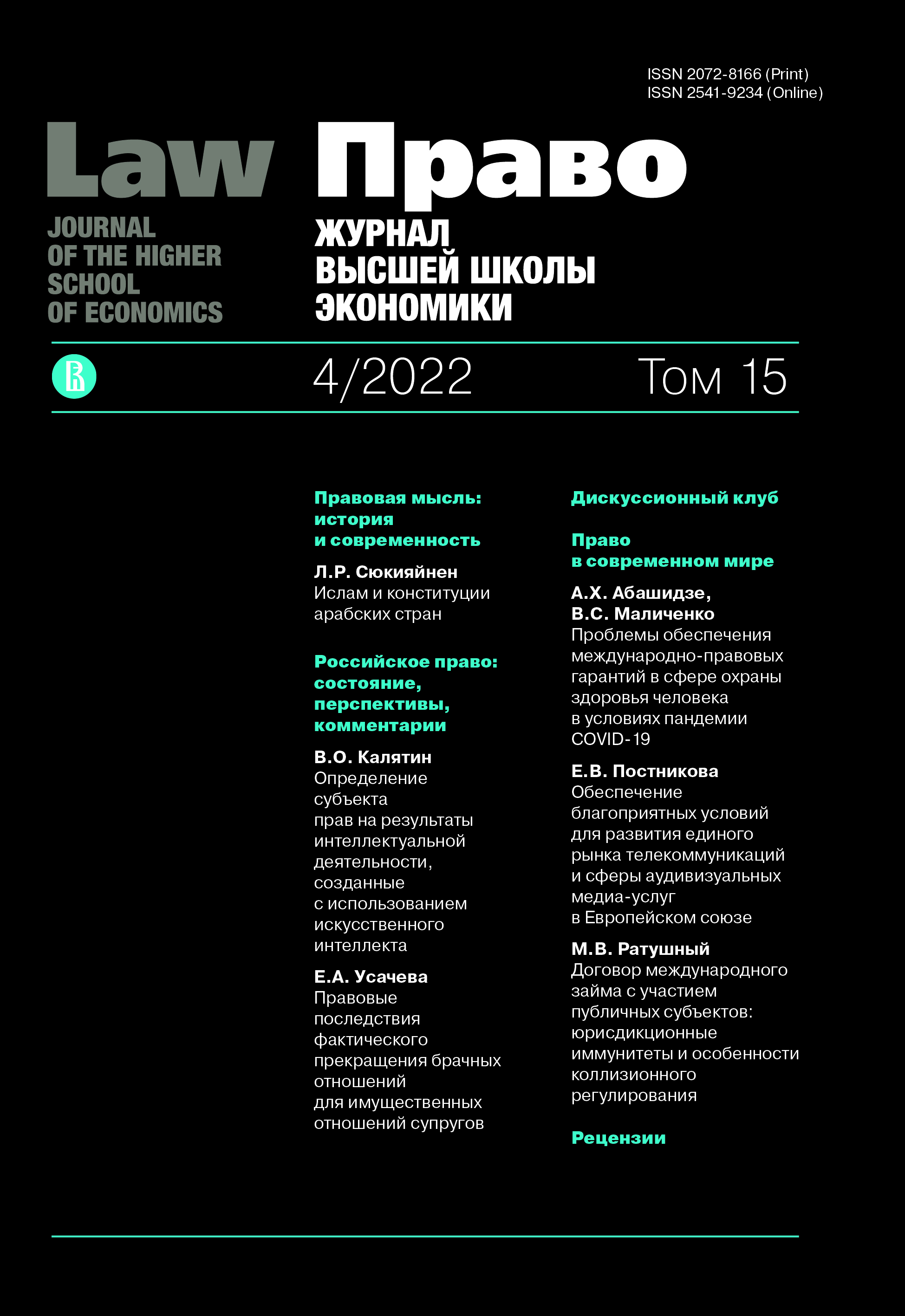Executing International Legal Guarantees of Human Health Protection in Context of COVID-19 Pandemic
Abstract
The coronavirus pandemic has become the biggest challenge to humanity over the whole century, exposing a number of systemic issues in the field of human health, both at the national and international levels. The catastrophic burden on health care facilities, coupled with the rapid growth in the need to provide health technologies, has increased the incidence of restrictions and discrimination in access to health care and medicines, especially in the developing world. The need to maintain balance between interests of healthcare technology companies and needs of the individual, is clearly seen since the unification of international legal mechanisms of intellectual property rights protection, and is being discussed with renewed interest in the context of the rapid growth of vaccines cost and other medicines for the treatment of COVID-19. In the article the authors analyze the international legal foundations of the right to the highest attainable level of health, formulated in acts of a universal and regional nature, as well as acts adopted by specialized international organizations. Particular attention is focused on analysis of vulnerable populations health protection, in the context of the growing negative consequences of the pandemic spread. Authors highlight the vulnerability of health workers to infectious pandemics, which increases potential barriers to ensuring the right to health among the entire population. The paper establishes the relationship between ensuring the protection of human health and the implementation of other fundamental human rights affected by the spread of the virus, such as the right to food, the right to water and sanitation. In the context of a significant increase in the problem of restricting access to health technologies, the article justifies need for rational application of norms in the field of intellectual property rights protection to ensure execution of the right to the highest attainable standard of health. The authors analyzed the international legal mechanisms aimed at expanding access to vital healthcare technologies in emergency situations. The article draws attention to the various forms of illegal activity, which dramatically rises under the influence of medical products shortages and significantly limits exercising human rights.References
Amin T. (2017) Voluntary licensing practices in the pharmaceutical sector: an acceptable solution to improving access to affordable medicines. Available at: htpps://www.i-mak. org/wp-content/uploads/2017/10/Oxfam-VoluntaryLicensingResearchIMAK-Website. pdf (accessed: 22.02.2022)
Bermudez J. (2010) The UNITAID patent pool initiative: bringing patents together for the common good. The Open AIDS Journal, no. 4, pp. 37-40. DOI: https://doi.org/10.2174/1874613601004010037
Dalglish S. (2020) COVID-19 gives the lie to global health expertise. The Lancet, no. 395 (10231), p. 1189. DOI: https://doi.org/10.1016/S0140-6736(20)30739-X
Fidler D. (2012) Negotiating equitable access to influenza vaccines: global health diplomacy and the controversies surrounding avian influenza H5N1 and pandemic influenza H1N1. In: Negotiating and navigating global health: case studies in global health diplomacy. E. Rosskam (ed.). Hackensack (N.J.): World Scientific Publishing, pp. 161172. DOI: https://doi.org/10.1142/9789814368049_0008
Gottret P., Schieber G. (2006) Health financing revisited: a practitioner's guide. Wash.: World Bank Publications, 340 p. DOI: https://doi.org/10.1596/978-0-8213-6585-4
Harris J., Stevens P., Morris J. (2009) Keeping it real: protecting the world's poor from fake drugs. Available at: htpp://www.africanliberty.org./wp-contene/uploads/ keepingitreal. pdf (accessed: 22.02.2022)
Kirby T. (2021) New variant of SARS-CoV-2 in UK causes surge of COVID-19. The Lancet Respiratory Medicine, no. 2, pp. 20-21. DOI: https://doi.org/10.1016/S2213-2600(21)00005-9
Khabrieva T. Ya. (2022) Jurisprudence of the pandemic: an emergency territory. Zhurnal zarubezhnogo zakonodatelstva I sravnitelnogo pravovedenia=Journal of Foreign Legislation and Comparative Law, vol. 18, no. 1, pp. 5-9 (in Russ.) DOI: https://doi.org/10.12737/jflcl.2022.001
Maani N., Galea S. (2020). COVID-19 and underinvestment in public health of the United States. The Milbank Quarterly, no. 2, pp. 250-259. DOI: https://doi.org/10.1111/1468-0009.12463
Püras D. et al. (2020) The right to health must guide responses to COVID-19. The Lancet, no. 395, pp. 1888-1890. DOI: https://doi.org/10.1016/S0140-6736(20)31255-1
Prante F. et al. (2020) Decades of tight fiscal policy have left the health care system in Italy ill-prepared to fight the COVID-19 outbreak. Intereconomics, no. 55, pp. 147-152. DOI: https://doi.org/10.1007/s10272-020-0886-0
Shadmi E. et al. (2020) Health equity and COVID-19: global perspectives. International Journal for Equity in Health, vol. 19, no. 104, pp. 1-16. DOI: https://doi.org/10.1186/s12939-020-01218-z
Tan-Torres E. et al. (2020) Projected healthcare resource needs for an effective response to COVID-19 in 73 low-income and middle-income countries: a modelling study. The Lancet Global Health, no. 8, pp. 1372-1379. DOI: https://doi.org/10.1016/S2214-109X(20)30383-1
Toebes B. (2010) Human rights and health sector corruption. In: Global Health and Human Rights. N.Y.: Routledge, pp. 112-144. DOI: https://doi.org/10.2139/ssrn.2327569
Wu K. (2021) Coronavirus reinfection will soon become our reality. Available at: https://www.theatlantic.com/science/archive/2021/02/coronavirus-reinfection/618128/ (accessed: 22.02.2022)
Copyright (c) 2022 Law Journal of the Higher School of Economics

This work is licensed under a Creative Commons Attribution-ShareAlike 4.0 International License.


















